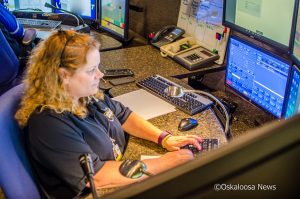Dispatchers Week Highlights the Vital Role 911 Dispatchers Play in Saving Lives
Oskaloosa, Iowa – When the world seems to be falling apart, and you pick up your phone and dial 911, you want help to arrive to your door as soon as possible.
Mahaska County dispatchers hear it all: the cries of a mother whose child is in distress or a suicidal person as they make their decision to live or die.
Janel Legvold is a Mahaska County Dispatcher in her 10th year on the job. She came into the job familiar with what would be required of her, because she was a firefighter, and she thought it would be a “fun, interesting job to do”.
Legvold enjoys her time behind the dispatching console due to the variety of work she encounters. “You work with the same people, but it’s always different situations that come up.”
“It’s challenging in some way,” added Legvold. “Just very rewarding.”
Legvold wishes she had discovered dispatching earlier in life. “I wish I had started here after high school.”
In Mahaska County, the dispatchers have taken courses for emergency medical dispatching, which helps dispatchers ask better questions and get the most important information out to emergency personnel as quickly as possible.
The Mahaska County Dispatch personnel are also able to help instruct in real time how to perform life saving measures on victims. Something that isn’t easy. During CPR, chest compressions can be difficult for family members to do when they hear and feel the chest cracking, or have to put direct pressure on a wound.
“There are times it’s very emotional,” says Legvold of talking family members through CPR. “There are times after a call where we break down. That’s where we are a family and we’re there for each other. Especially when it comes to children. That’s really tough.”
Helping dispatchers stay focused is a set protocol that they follow, which helps to keep the emotions at bay during the call. It’s when the 911 call is disconnected that the emotions really kick in. “It’s very rewarding, and I’m not going to say it’s not heartbreaking at times, cause there are times it does just break your heart,” added Legvold.
At the end of the day, many times those emergency personnel on the scene have their picture taken and are often highlighted in the news as heroes, while the individuals like Legvold, who work from behind the scenes, often times don’t get the pat on the back that others at the scene may. “That’s not why we do this job,” says Legvold. “We do this job because we love it. We do this job because we want to help.”
Often times, dispatchers who have become involved with an emergency don’t know how the situation ended, and often times don’t get the closure that other emergency personnel do.
“There have been several of them,” says Legvold of those times when she just knows she’s in the right profession. Legvold has received an award for saving a life during CPR. “The opportunity to maybe give somebody a chance to continue living. That’s really rewarding.”
When things haven’t been going so well, Legvold says you have to remind yourself of those times when the outcome maybe was better. “There are some that stay with you no matter what,” says Legvold.
Legvold says that there is a solid support base within the emergency personnel ranks. “We’re a family. Those are my brothers and sisters out there on the road. I want to make sure they come home at the end of the night.”
Mahaska County Emergency Manager and E911 Director, Jamey Robinson, refers to dispatchers as “the unseen first responders. The unsung heros.”
“Our staff is amazing,” added Robinson. “They take the extra training to do emergency medical dispatching.”
Not all public service answering points, like the Mahaska County 911 Center, do emergency medical dispatching. Those precious few minutes can make the difference in matters of life and death in a rural community. “They [dispatchers] are very dedicated to that training,” added Robinson.
When it comes to helping his dispatchers cope and deal with tragic situations, Robinson says that he works with his staff to make sure they have the time to “step away” and get counseling or critical incident stress management, which involves speaking with their peers and listening to each other. “We definitely want to give them that time where they can step away from that radio, so they can try to process what they just went through.”
“It’s hard,” says Robinson. “Well, use the example of a mom doing CPR on her child, and in your head, that’s you doing CPR on your child. It’s going to bother you.”
A recent study in the Journal of Traumatic Stress revealed that direct exposure is not necessary for the development of PTSD like symptoms.
The study assessed duty-related exposure of calls, particularly potentially traumatic calls from a sample of 171 telecommunicators, or 911 dispatchers. The study found a moderate positive relationship between peritraumatic distress and PTSD.
Most dispatchers work in the field for two years. Mahaska County is fortunate to have a group of dispatchers who have been on staff for 10 or more years.
Legvold has only two words to describe the work she does, “Very rewarding.”
You can follow the Mahaska County 911 Center on Facebook HERE – https://www.facebook.com/mcema911/
Editing by Ginger Allsup
















